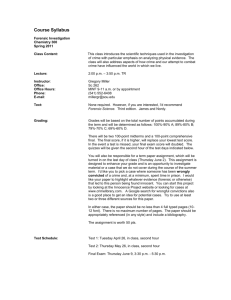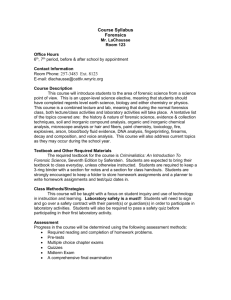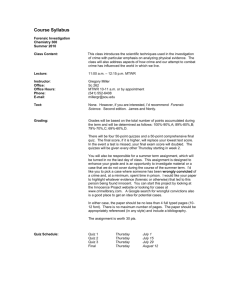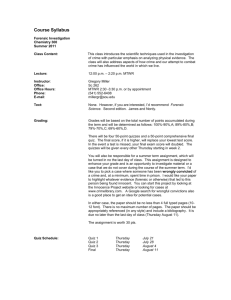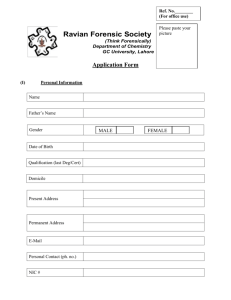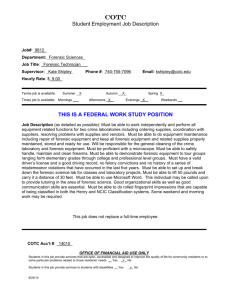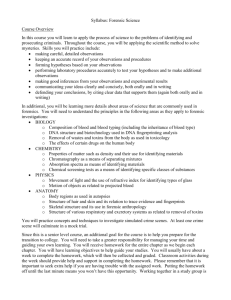Forensic Investigation
advertisement
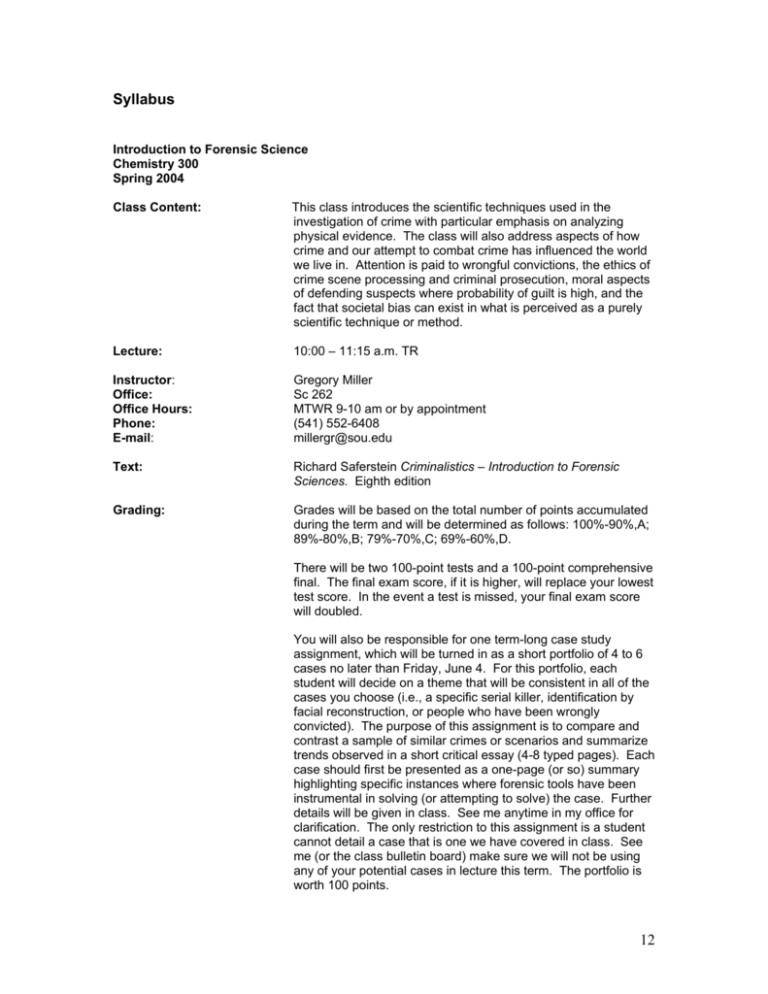
Syllabus Introduction to Forensic Science Chemistry 300 Spring 2004 Class Content: This class introduces the scientific techniques used in the investigation of crime with particular emphasis on analyzing physical evidence. The class will also address aspects of how crime and our attempt to combat crime has influenced the world we live in. Attention is paid to wrongful convictions, the ethics of crime scene processing and criminal prosecution, moral aspects of defending suspects where probability of guilt is high, and the fact that societal bias can exist in what is perceived as a purely scientific technique or method. Lecture: 10:00 – 11:15 a.m. TR Instructor: Office: Office Hours: Phone: E-mail: Gregory Miller Sc 262 MTWR 9-10 am or by appointment (541) 552-6408 millergr@sou.edu Text: Richard Saferstein Criminalistics – Introduction to Forensic Sciences. Eighth edition Grading: Grades will be based on the total number of points accumulated during the term and will be determined as follows: 100%-90%,A; 89%-80%,B; 79%-70%,C; 69%-60%,D. There will be two 100-point tests and a 100-point comprehensive final. The final exam score, if it is higher, will replace your lowest test score. In the event a test is missed, your final exam score will doubled. You will also be responsible for one term-long case study assignment, which will be turned in as a short portfolio of 4 to 6 cases no later than Friday, June 4. For this portfolio, each student will decide on a theme that will be consistent in all of the cases you choose (i.e., a specific serial killer, identification by facial reconstruction, or people who have been wrongly convicted). The purpose of this assignment is to compare and contrast a sample of similar crimes or scenarios and summarize trends observed in a short critical essay (4-8 typed pages). Each case should first be presented as a one-page (or so) summary highlighting specific instances where forensic tools have been instrumental in solving (or attempting to solve) the case. Further details will be given in class. See me anytime in my office for clarification. The only restriction to this assignment is a student cannot detail a case that is one we have covered in class. See me (or the class bulletin board) make sure we will not be using any of your potential cases in lecture this term. The portfolio is worth 100 points. 12 Test Schedule: Tentative Class Schedule: (Saferstein Chapter #) Test 1 Test 2 Final Week of: March 30 Important Notes: Thursday, April 22 Thursday, May 20 Tuesday, June 8, 7:30 - 9:30 a.m. Introduction to Forensic Science (1, 2, 3) Basics of Chemistry April 6 Latent Fingerprinting Techniques (14) April 13. Arson Investigations (5, 11) April 20 finish Arson/Explosives, begin Forensic Toxicology/Pharmacology (9, 10) April 27 finish Toxicology/Pharmacology. May 4 Intro to Forensic Serology and DNA Techniques (12, 13) May 11 finish Forensic Serology, DNA techniques May 18 Forensic Pathology (not in text) Autopsy procedures (not in text) May 25 Introduction to Forensic Anthropology and Odontology Please inform me if you know of any chemical allergies that you may have. Attendance is not required but very highly encouraged. A copy of this syllabus can be found, along with all PowerPoint presentations used in class, at the class website: www.sou.edu/chem/faculty/miller/forensics.htm National Evaluation: As part of SOU’s evaluation of this course, our class will fill out a brief evaluation of the course online. Please go to the following website to complete the short questionnaire at or near the end of the quarter: www.wcer.wisc.edu/salgains/student/default.asp The course ID number is 714708853 and the password is scienceisfun Please bring me a printout of the screen obtained upon completion of this short questionnaire with your name written plainly on the front. Remember, the forensics gods are watching and will smile on you in the future for your effort. Your online answers are completely confidential. Thank you!! 13 Classroom Ethics: In all subjects, academic honesty is mandatory. Guidelines to SOU student conduct regarding plagiarism and other forms of academic dishonesty can be found on the web at http://www.sou.edu/studentrights/ SOU Disability Services: If you are in need of academic support because of a documented disability (whether it be psychiatric, learning, mobility, health related, or sensory) you may be eligible for academic accommodations through Disability Services for Students. Contact Margaret Dibb, Director, DSS, at 552-6213, or schedule an appointment in person at the Access Center, Stevenson Union, lower level. Supporting Material Sample Test Questions The tests in this class are often mixtures of multiple choice, short answer, and/or application questions. The relative percentages of each are largely based on the size of the class. Forensic Jeopardy Why have simple review session before a test when the class can play Jeopardy? This template was graciously provided by Bill Arcuri. The game can be played in teams or individually using the EduCue PRS system to “buzz in.” Providing bells or horns (in place of buzzers) to your students can be equally effective although somewhat more obnoxious. 14
